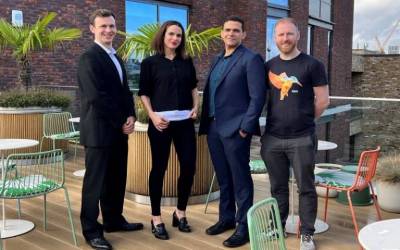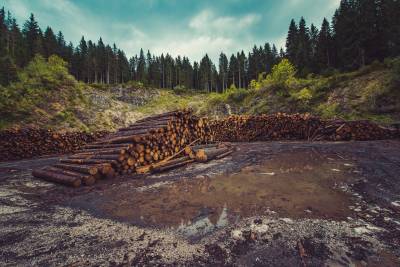Building a sustainable future
UCL Anthropocene academics make an impact at COP26

Their research spanned a number of important areas contributing to decision-making on climate change policies. The breadth of work included thinning of sea ice, plastic pollution, climate anxiety and the concept of ‘loss and damage’ – where financial reparation is made for land and livelihoods lost to climate change.
As well as sharing their findings, UCL academics were regularly invited by news outlets to help explain what was happening at the conference with the wider public. Mark Maslin, leading UCL’s presence at COP described the opportunity as “a seismic change in the organisation and its impact”.
Climate tech spinout uses AI to cut gigatons of industry emissions

Thanks to ‘deep reinforcement learning’, a field of AI best suited to managing complex decision making, the online platform can analyse manufacturing data by modelling the manufacturing environment. It then makes recommendations on how to streamline the process to be more efficient, saving companies millions and protecting the environment from gigatons of emissions.
Awarded a £1 million joint investment by The Clean Growth Fund, UCL Technology Fund, UCL Business Ltd’s Portico Ventures and others, the team behind CarbonRe will now set to work commercialising ready for rollout around the world to target the cement industry initially, then steel and glass.
‘Ecocide’ defined by UCL-led panel as an international crime

Last year a panel of global legal experts co-chaired by Professor Philippe Sands QC, Professor of Public Understanding of Law at UCL, drew up the definition of ‘ecocide’ as an international crime, punishable by the international criminal court (ICC).
The proposed law would give the ICC additional powers, building on the existing crime of severe environmental damage caused during war, whilst reflecting that today, most severe environmental damage occurs during times of peace.
If adopted, it will become the fifth offence that the ICC can prosecute, alongside war crimes, crimes against humanity, genocide and the crime of aggression.
“The four other crimes all focus exclusively on the wellbeing of human beings. This one of course does that but it introduces a new non-anthropocentric approach, namely putting the environment at the heart of international law, and so that is original and innovative.
For me the single most important thing about this initiative is that it’s part of that broader process of changing public consciousness, recognising that we are in a relationship with our environment, we are dependent for our wellbeing on the wellbeing of the environment and that we have to use various instruments, political, diplomatic but also legal to achieve the protection of the environment
Professor Philippe Sands QC, Faculty of Laws
You can read more about the work including the full definition here.
UCL wins prestigious Green Gown award for Climate Action
In March UCL was named the winner of the Green Gown Award for our campaign to become a zero-carbon institution by 2030.
The award recognises work of our Positive Climate initiative that puts students and staff at the centre of our efforts to reduce our carbon footprint. This includes carbon awareness programmes drawing on research by our behavioural scientists exploring the changes to our day-to-day habits that add up over time.
Key elements of our plans include a £10m investment to deliver zero carbon buildings by 2024, and a plan for the university to be powered by 100% UCL-generated renewable energy by 2030 including the use of innovative heat recovery in London’s underground networks.
UCL’s programme is already set to deliver a reduction of 25,000 tonnes of CO2 per year by 2024 - the equivalent to planting 400,000 trees every year. The Green Gown award follows UCL coming top of the University Carbon League table, receiving a score of 95/100, the highest score out of 519 institutions in the UK. We couldn’t be prouder of the work going on across the university and thank everyone who has contributed to this extraordinary achievement.
Images
- Landing page thumbnail: ‘Plant Orbiter’ hydroponic plant growing machine, credit Nick Laessing via Delfina Foundation
- ‘Plant Orbiter’ by Nick Laessing, PhD researcher at The Slade School of Art and The Electrochemical Innovation Laboratory
- Co-founders of CarbonRe
- Logging, credit Ales Krivec on Unsplash
 Close
Close

